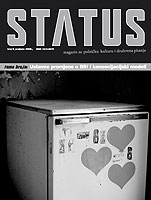Legitimitet između mita i zakona
Legitimacy between myth and law
Author(s): Ivo LučićSubject(s): Politics / Political Sciences
Published by: Udruga građana »Dijalog«
Summary/Abstract: The author's focus is on the friction between political mythologisation, on the one hand, and the need to create a rational constitutional arrangement for the BiH, based on the idea of the rule of law and supported by a consensus of all the peoples and citizens of the BiH. He illustrates the processes of political mythologisation specifically by quoting the authors from within the so-called Bosniac national-cultural circle including not only politicians but also historians and religious leaders. In his opinion, the Bosniac national mythology revolves around a number of oft-repeated and even mutually inconsistent ideas: 1. the Bosniac people has been, and remains, a victim of external and aggresive nationalisms; 2. the Bosniac people is a priori good and innocent; 3. Bosnia (with Herzegovina frequently and deliberatelly ommitted) is characterised by a spirit of friendly 'komshiluk', which implies no need to discuss institutional arrangements for protection of special interests and preferences (this idea goes frequently together with an reality-denying and romanticist idea about the period of the Ottoman rule as a period of which the Bosniac people should be especially proud); 4. the Bosniac people claims a special right to the BiH and represents its most fundamental people. Starting with such ideas, that occur time and again in the Bosniac spiritual-political circles, one can hardly initiate a proces of rational bargaining over the constitutional arrangements that would be satisfactory to all the peoples and citizens of the BiH. The author concludes with saying that the BiH was created, and is able to progress, only as a state that all three peoples will consider as their own; hence the relationships between the peoples, together with mutual relations of the citizens of the BiH, must not remain undefined and murky. Those need to be arranged through a constitution which will reflect their will, by the means of laws equal for all and in an social atmosphere of mutual respect and trust. Seen in the light of such goals, the creation of a surplus of equality, of those 'more equal', through the exploitations and manipulations of both myths and victims is not acceptable. It puts into question any legal arrangement and hence the future of the BiH too. The 'more equal' exploit the tragedy of their victims to establish their right to the state as exclusively, or primarily, their own. They seek to assume the status of a fundamental people, which cannot meet with approval of all the others. They are trying to find a non-found-able origin in their national myths and apparitions, that no serious historiography could verify, whereas to the others they contemplate a found-able end. It is a mistake to call them 'the cleverest' or 'the leading', as the solutions they offer are neither clever nor they lead somewhere; such solutions had already been exposed.
Journal: STATUS Magazin za političku kulturu i društvena pitanja
- Issue Year: 2006
- Issue No: 09
- Page Range: 108 - 114
- Page Count: 7
- Language: Croatian

